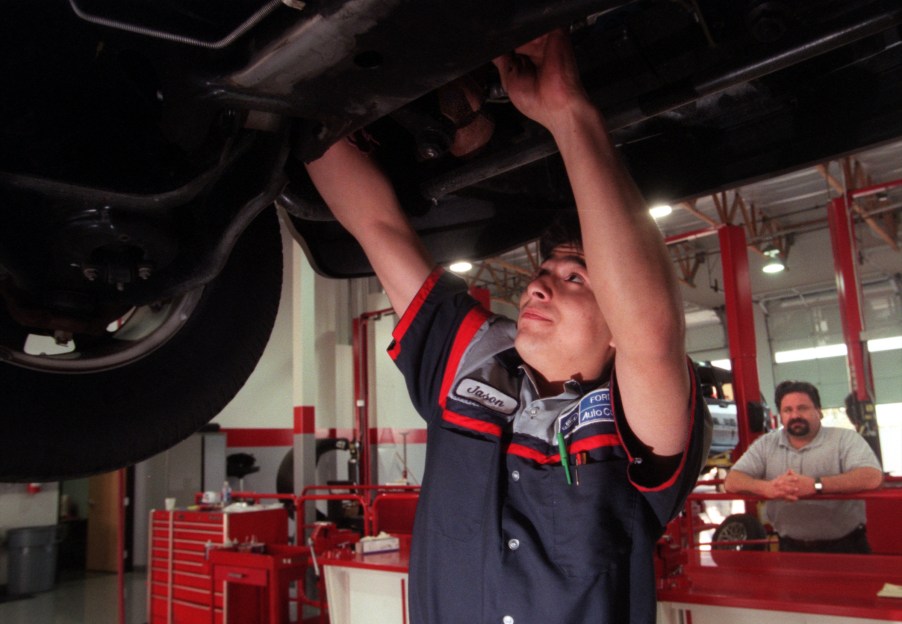
Automotive Technicians Are in Short Supply, Even as Car Technology Advances
If you’ve ever had an interest in automotive maintenance, now might be the best time to become a technician. But it also might be the worst. With expert mechanics retiring, and more complex cars being built, the need for automotive technicians has grown exponentially. Unfortunately, not enough people are filling in the role.

How bad is the automotive technician shortage?
To understand the shortage, you have to have a working knowledge of the industry itself. Many feel that dealerships don’t treat members of the service team quite as fair, especially compared to the sales team. For automakers, the sale is the most important aspect, which means those employees often get better benefits and pay than a trained technician.
That said, dealerships manage to keep the service bays far cleaner than an independent workshop might. Now, this may be straying into opinion, but the environment of some independent shops can be “casual” to say the least. It’s loud, it’s dirty, and it’s incredibly hectic. In other words, it’s not a place most folks want to spend hours in.
And job growth isn’t excellent either. The flat salaries aren’t all that incentivizing, not after sinking money into trade school. And while you can become a service writer or store manager, every six-digit salary falls under the sales category. Meanwhile, service gets the short end of the stick.
But many people do it solely because they love working on cars. It’s a game of problem-solving and ingenuity, one that required critical thinking and physical strength. Most DIY mechanics take pride in their work, and it’s the main reason folks are interested in cars in the first place. But sadly, folks like that are a dying breed.
Less people like to work on cars now than ever before

Now, more than ever, people don’t work on their own cars, and interest in DIY projects is shrinking. Why build something when you can buy it, or have someone else build it for you? “Virtually every dealer I know says they have an opening for a tech at some level,” said, Mary Lynn Alvarino, director of operations at the Auto Dealers Association of Greater Philadelphia. She spoke to The Philadelphia Inquirer, and said “if someone were to present themselves at a dealership and say, `I don’t have any professional training, but I’m interested in cars,’ they’d say, `Let’s sit down and talk, and we’d love to have you onboard.’”
While her group represents 180 dealerships in the area, this isn’t just a problem in Philadelphia. This is a national issue, with mechanics quitting and fewer people being hired to replace them. The low salaries and underwhelming job potential certainly steers people away from being a technician. But many point the finger at society.
Many parents believe in sending their children to a traditional four-year college rather than a trade school. That Bachelor’s Degree will (hopefully) get them better-paying jobs. In other words, we’re no longer encouraging people to become mechanics as we did in the past. Nor are people inspired to work on their own cars, as it’s cheaper to pay someone else.
The shortage is a combination of uninspiring salaries, subpar work environments, and more complex tech in cars that are driving away new mechanics and pushing experienced mechanics to their limits. So while the future of cars is certainly electric, will they be easy enough to fix?
Will the electric cars of the future be easier to maintain?

The cars of tomorrow will likely be fitted with computers that can diagnose problems with the car. But that doesn’t mean they can fix themselves. You’ll still need a technician to fix the cars, even as they go electric.
These advanced technologies can’t control normal wear, tear, and maintenance. Tires, oils, and brakes all need to be replaced at certain intervals. And fewer people know how to perform those tasks (I personally can change my oil and rotate my tires, but haven’t tried brake or tire replacement yet).
We’ve failed to inspire future generations that cars are exciting and that fixing them is rewarding. Instead, we’ve encouraged them to make enough money to pay for nice cars and the repair bills that come with. But who are you going to pay if there aren’t enough trained technicians to work on the car? Of course, there are many maintenance jobs best left to the professionals, just be sure that you’re treating the staff with the respect they deserve.


